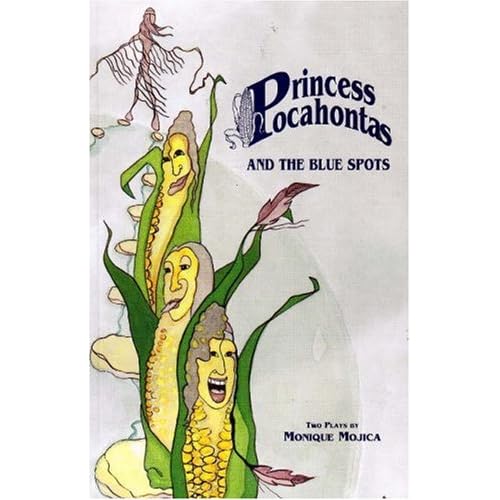Welcome to another instalment in our series of blog posts about Aboriginal literature. I confess I've been a bit distracted by another excellent Aboriginal writer who's addressing the same theme - the burgeoning Aboriginal literature scene in Canada. . If you haven't seen it yet, check out Wab Rice's blog on Aboriginal literature. It's part of the recent 8th Fire series that you may have seen on TV or heard on the radio. Wab is a perceptive and eloquent commentator, and he's forced us non CBC-types to forage in literary bushes for works that have escaped his attention. :)
Well, I'm up to the challenge, and goodness knows there are enough outstanding works of contemporary Aboriginal literature to keep us both busy.

For example, consider a little known play called "Princess Pocahontas and the Blue Spots" by actress and playwright Monique Mojica. It's a superb example of the new Aboriginal theatre, a movement that has been producing some of most exciting contemporary plays in Canada.
This is a very physical play, with strong visual elements, so it's obviously better seen than read. But the hilarious plot and sparkling dialogue more than justify a read.
Like many Aboriginal authors, Mojica uses humour and irony to tell a difficult and even traumatic story by incorporating the Trickster, who is on full display in this play. She tackles the stereotypes and patriarchal attitudes behind the myths and legends of such characters as Pocahontas (a Powtahan girl in Virginia who saves the life of Captain John Smith and saves many colonists from starvation) and Malinche (a woman who was an interpreter and strategist for the Spanish Conquistador Hernan Cortez). Pocohontas, Malinche and other women like them have become 'Indian princesses' in popular culture, moulded into cute storybook characters or scheming temptresses.
In "Princess Pocahontas and the Blue Spots", Mojica gleefully plays up all of these stereotypes, often to comical result. The play opens with a Pocahontas character participating in the 498th annual Miss North American Indian Beauty Pageant. For her talent competition, she sings a very shocking and unabashed song that mocks the stereotype. Here are just a few lines:
"Captain Whiteman, for you I will convert
Captain Whiteman, all my pagan gods are dirt
If I'm savage, don't despise me
'cause I'll let you civilize me
O Captain Whiteman, I'm your buckskin clad dessert"
This is typical of the play's raw, raunchy humour. But as you laugh your way through it, you'll find your own perceptions and understanding of history challenged and prodded. Without a hint of preachiness, Mojica conveys a powerful message about gender, myth, history, colonialism, creation and healing.
(Oh and BTW, the "Blue Spots" in the title have a double meaning. They are the name of the 'do wop' girls that accompany Pocahontas in the beauty pageant, but also refer to the blue or purplish spots that appear on the lower back of Aboriginal and Asian babies when they are born.)

No comments:
Post a Comment
Please review our comments policy, posted here: http://ccg-ourtimes.blogspot.com/p/comments-policy.html
Comment Moderation has been enabled; your comment will be reviewed by the Editors before posting. Our kids, parents, spouses, friends and clients read this site. So please be nice.